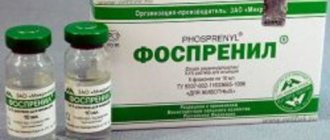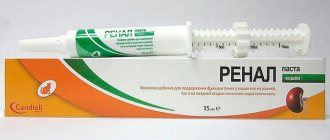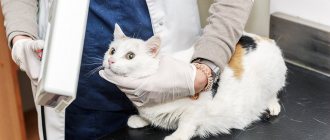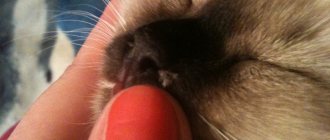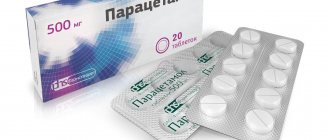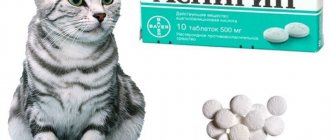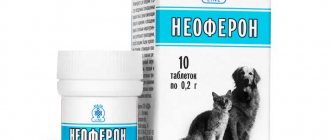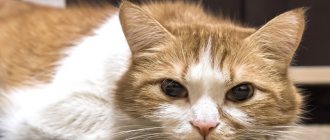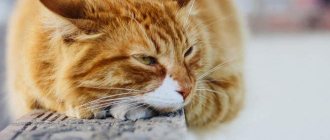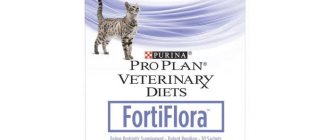6630Pavel
Despite the fact that cats are considered very clean animals, they do get sick. Pets are often prescribed a drug such as Bifidumbacterin for cats. No one is immune from disease, but the duration of the disease and its course largely depends on the owner.
After all, it is important at the very beginning to bring the cat to the veterinarian for examination in time to make an accurate diagnosis, possibly undergo the necessary tests and monitor effective treatment. You need to be prepared for all this. This costs time and, of course, money. But as they say, a cat becomes a full-fledged member of the family, and it needs to be treated just like any other family member.
© shutterstock
Composition and principle of operation
The probiotic Bifidumbacterin restores the protective functions of the intestines and has an antiallergic effect.
The medicine contains bifidobacteria bifidum, which normalize the intestinal microflora, destroy pathogenic and conditionally pathogenic microorganisms, and at the same time, normalize the functioning of the gastrointestinal tract, prevent complications of intestinal pathologies and restore impaired enteral synthesis of many vitamins and other substances. The drug is sold in the form of tablets, powder and suppositories. For each case, the most suitable dosage form is selected. If it is easy for cats to swallow tablets, then treatment with tableted “Bifidumbacterin” is quite possible. For the rest, the probiotic can be prescribed in powder. It is worth noting that the pharmaceutical product in question is absolutely safe for kittens, since it does not contain chemical additives.
Effective drugs
Today, many products have been developed aimed at treating dysbiosis. These are products of both Russian and foreign companies. Check out the list of medications to know what to give your cat for diarrhea (after consulting with your veterinarian).
The drug contains a mixture of antioxidants, a prebiotic, natural sugars, micro- and macroelements, a natural mineral sorbent and antimicrobial natural substances. It is a brown powder with shiny inclusions that have a pearlescent sheen. It has no taste or smell. This is a pure, natural product with prebiotic, probiotic and sorbent properties. Absorbs and removes toxins from the body.
The activity of the drug is determined by the bifidobacteria and lactobacilli included in the composition, which are active against a wide range of opportunistic and pathogenic microorganisms. Expanded vermiculite, used as an adsorbent, absorbs gases, alkaloids, and heavy metal salts.
The drug is used mixed with milk, water, colostrum or feed. The suspension is prepared immediately before use, shaking the composition well until smooth. Adult cats are given 0.3 grams per day for 2-3 days. For kittens, the dose is halved.
Probiotic that normalizes intestinal microflora. Made with the yeast Saccharomyces boulardii, which competes with opportunistic and pathogenic microorganisms for space in the intestines. This opposition explains the antimicrobial effect of the drug against Klebsiella, Clostridia, Shigella, Candida, Staphylococcus, Yersinia and other pathogenic microorganisms.
Indications for use
For diarrhea, regardless of origin (viral, bacterial or stress), the instructions for use recommend using Enterol. The price of the drug is quite affordable - 10 sachets for preparing a suspension are 320 rubles. The drug is used for prophylactic purposes during antibiotic treatment.
Application and dosage
The daily dose for an adult animal is one sachet per day. The dose can be divided into two doses - morning and evening. For kittens, the dosage is halved.
The drug contains a microbial lyophilized mass of live active bacteria, which are sorbed on lactose filler particles and crushed activated carbon.
Instructions for use
Before starting treatment of cats with a probiotic based on bifidobacterium bifidum, it is necessary to show your pet to a veterinarian. The doctor will make sure that such treatment is necessary, determine the severity of the cat’s condition, and weigh the purr to determine the optimal dosage. It is strictly forbidden to make adjustments to the therapeutic regimen on your own.
If the veterinarian prescribed “Bifidumbacterin” in powder form to eliminate vomiting and intestinal upset, then the cat is given it twice or thrice a day, after diluting it with water according to the instructions. Usually the condition normalizes in 2-3 days. The prepared probiotic solution must be drunk within the first 5 hours after dilution; after this time it is considered spoiled. The dosage is calculated based on the weight of the pet, for example, for small kittens lighter than 2 kg, ½ capsule is prescribed, which must be opened and its contents divided into equal parts.
Features of probiotics for cats
Intestinal dysbiosis of dogs (dysbiosis) is a violation of the composition of the intestinal microflora.
The term “intestinal dysbiosis” means the appearance of a significant number of microbes in the small intestine and a change in the microbial composition of the large intestine. In the colon, the total number and properties of microorganisms change, their invasiveness and aggressiveness increase. The extreme degree of intestinal dysbiosis is the presence of gastrointestinal bacteria in the blood (bacteremia) or even the development of sepsis.
With dysbacteriosis in dogs, beneficial microflora organisms begin to disappear from the intestines, and pathogenic and opportunistic types of microorganisms begin to predominate. Bifidobacteria, lactobacilli, and E. coli begin to replace staphylococci, Proteus, fungi of the genus Candida, and Pseudomonas aeruginosa. Dysbacteriosis in dogs aggravates the course of many concomitant diseases, significantly complicating them.
The load on the digestive organs increases, the absorption process is disrupted and, as a result, chronic diseases of the skin and respiratory tract are complicated. One of the most important reasons for the development of dysbacteriosis in animals is a violation of the feeding regime, in particular, feeding large amounts of carbohydrate food (porridge, dry food, etc.) to carnivores (dogs and cats).
Symptoms
- diarrhea, constipation, colitis;
- gastritis, duodenitis, peptic ulcer of the stomach and duodenum;
- constipation, diarrhea, irritable bowel syndrome, bloating
- hypo- and hypertension;
- acute mesenteric ischemia (impaired intestinal circulation);
- hypo- and hypercholesterolemia;
- urolithiasis disease;
- bronchial asthma, atopic dermatitis, other manifestations of allergies;
- portal systemic encephalopathy, other liver damage;
- endo- and superinfections of various localizations;
- anemia, cachexia, gout, other diseases of water-salt metabolism;
- intrauterine infection of the fetus.
- elimination of excess colonization of the intestines (phages, antibacterial drugs, waste products of normal flora, in the form of lactic acid);
- removal of toxic substances from the body accumulated during the period of illness (sorbents, infusion solutions);
- restoration of normal microbial flora (prebiotics, probiotics, eubiotics);
- improvement of intestinal digestion, absorption, restoration of metabolism (diet, vitamin, mineral supplements);
- increasing the body's reactivity (immunomodulators, immunocorrectors).
Treatment of dysbiosis in dogs can only be prescribed by a veterinarian.
To treat dysbiosis, medications containing beneficial bacteria are taken. Pathogenetic therapy is aimed at the primary pathology, and also includes measures to restore intestinal motor functions, relieve inflammation, and perform enzyme replacement therapy.
Patients with intestinal dysbiosis are prescribed a diet (modifications depending on the condition) that help normalize intestinal activity and reduce the activity of putrefactive processes. Nutrition must be carefully balanced in terms of nutrient composition and energy content. It is imperative to maintain a balance of proteins, fats, carbohydrates, supply the body with vitamins and microelements, and a sufficient amount of fluid. It is necessary to pay attention to the diet and its compliance with biorhythms.
- Inclusion of foods containing dietary fiber and live bacterial cultures into the diet.
- Correction of the microflora composition with the help of selective non-absorbable antibacterial drugs (rifaximin), intestinal antiseptics (enterofuril), drugs containing antagonist cultures of pathogenic intestinal flora, bacteriophages.
- To restore immunity, immunomodulators are used (immunal and other echinacea preparations, decaris, nucleic acids, etc.).
For the purpose of prevention, the animal is prescribed a fasting regime for up to 12-24 hours, so that there must be water, and you can also give chicken broth (10 days). It is also good to give a decoction of juniper and bird cherry. After diagnosis, on the second or third day, the dog is given raw eggs. At 4-5 they begin to give fermented milk products (milk, kefir).
In severe cases, it is necessary to administer intravenous and subcutaneous saline solutions. A course of treatment with antibiotics (ampiox sodium, ampicillin), chloramphenicol, vetrim biseptol, furadonin is also prescribed. For prevention, first of all, it is necessary to observe proper feeding and always fresh water. The animal should be fed 2-4 times a day.
In eliminating dysbiosis, the role of probiotics is great - bacterial preparations, which include a full-fledged viable microflora that has the ability to suppress pathogenic and conditionally pathogenic intestinal bacteria. Probiotics are preparations containing live microorganisms of normal intestinal microflora.
Probiotics for cats contain a mixture of high concentrations of beneficial bacteria, which saturate the animal’s body with energy, are easily digestible, and activate the immune system, preventing pathogenic microorganisms from diligently multiplying.
They are produced in the form of powders and gels or pastes, the only difference being the concentration of bacteria. Powders serve to get rid of minor ailments, such as stress. Gels and pastes treat diseases.
Capsules, pastes, liquids, tablets can be added to cat food. If food manufacturers claim that it contains probiotics, you should not take their word for it. There is little chance that bacteria will survive the food manufacturing process in a factory setting.
By the way, there are also natural probiotics that may be beneficial for cats that often suffer from diarrhea or other digestive disorders. This is, for example, yogurt that does not contain any additives.
When planning to add a probiotic to your furbaby's food, remember two important rules:
- Probiotics intended for cats and humans differ significantly from each other.
- It is necessary to consult a veterinarian regarding well-known brands, proper use and storage of drugs.
You do not need a prescription to purchase probiotics at the pharmacy. Unfortunately, it often happens that the number of bacteria indicated on the label is different from what is actually contained in the probiotic. Sometimes even it is too low, or the bacteria themselves are not at all what is advertised.
We invite you to read: Why cats leave home to die: the main reasons, signs, how the pet behaves
Among the most effective are:
- “Bifitrilak” (up to 50 rubles) from a mixture of antioxidants, natural sugars, micro- and macroelements, natural sorbent. Mix with milk, water, colostrum or food, after shaking until smooth. A cat can be given 0.3 g per day for two to three days; the dose for kittens should be half as much.
- “Enterol” (from 200 rubles) with yeast fungi Saccharomyces boulardii. It is added to drinks above 50°C and given to the cat a couple of hours after feeding, providing free access to water. A cat will need one sachet per day, if necessary, divided into two doses, morning and evening. Kittens - half as much.
- “Zoonorm” (from 100 rubles) with a microbial lyophilized mass of active bacteria. Animals, large and small, are given 5-10 doses.
- “Subtilis” (from 400 rubles) is a suspension with a mass of live strains of microorganisms Bacillus subtilis, Bacillus licheniformis, and water. Recommended for cats in a volume of 0.5 ml for five days.
- “Viyo” (from 300 rubles) is a nutritious drink. The cat is given one sachet of the drug per day, which contains meat and meat products, oils and fats, water and dairy products, inulin and minerals, as well as fructo-oligosaccharides. Shake before use and give to the animal in the morning either pure or diluted in water (1:3).
Of course, the dose and duration of use can be adjusted by your doctor.
The occurrence of diarrhea in pets is an unpleasant moment, which many simply do not pay attention to, because such a phenomenon in a dog does not always require treatment. After overfeeding, the animal’s body can easily cope with the problem on its own, but in other cases you need to know what to give your dog for diarrhea to alleviate the condition.
Cats become especially susceptible to dysbiosis in the following cases:
- while staying in a special hotel for cats;
- when moving to a new home;
- when a new animal appears in the house.
Emotional or physical stress can upset the balance of microflora in a cat's intestines, leading to constipation or chronic diarrhea. The consequences of these diseases can be very serious. The absorption of amino acids and other elements important for the health of the animal is impaired. As a result, this can trigger the development of allergies, sepsis and even intestinal lymphoma.
Often, pet owners are interested in what to give their cat for diarrhea. To answer this question, it is necessary to do tests and find out the cause of the disease. Only after receiving the results will the veterinarian be able to tell whether probiotics for cats are indicated in a given case.
Possible limitations and side effects
“Bifidumbacterin” is a low-toxic and absolutely safe medicine for cats, so the list of contraindications is small. The only limitation is individual intolerance to any component of the probiotic. It should also be used with caution in cats that suffer from chronic constipation, and it is also better to delay treatment with Bifidumbacterin for a kitten under 2 weeks old. Of the side symptoms of the probiotic, only signs of allergies are known.
The medical product is completely natural and does not have a toxic effect on the cat’s body, therefore it is safe to use.
List of drugs
Subtilis is suitable for animals that have experienced stress.
A combined probiotic product that consists of B. subtilis and B. Licheniformis bacteria. Reception is indicated for indigestion, reduced immunity and stress. "Subtilis" is available in the form of a dry powder or liquid, which is given to animals with food or diluted with water for drinking. There are no contraindications to taking the drug, and in the correct dose it does not cause any side effects.
"Biovestin"
The product is given to cats to restore their natural microflora after consuming antibiotics, in case of food allergies, infectious diseases and stressful situations. Biovestin is recommended to be taken with food or half an hour before eating. For effective therapy, the drug is used for at least 2 weeks.
Probiotic "Bifidum"
This drug can also be given to an animal for preventive purposes.
This is a monocomponent biologically active supplement that is used for diarrhea, poisoning, mastitis, to increase the animal’s body’s defenses, and also for detox when using antibiotics. After taking the drug, the symptoms of digestive disorders disappear within 24 hours. “Bifidum” is recommended to be given to kittens from 2 months of age both for the treatment of pathologies and for preventive purposes on an ongoing basis.
Havenaar R. proved in 1992 that probiotics are vital microorganisms that benefit the body of animals and humans, improving the functioning of the gastrointestinal tract.
The drug "Linex"
The drug is prescribed to cats for dysbiosis, as well as to prevent problems with the functioning of the gastrointestinal tract when using antibiotics. "Linex" suppresses the development of pathogenic microorganisms and strengthens the animal's immunity. The probiotic is prescribed twice a day, 1 capsule for two weeks. The tablet can be stuffed whole into the cat’s mouth or crushed and added to the cat’s food.
Similar medical products
If for some reason it is not possible to treat a cat with Bifidumbacterin, veterinarians replace it with a medication identical in pharmacological action. Bactisubtil is often prescribed to replace the probiotic in question for cats. It also effectively treats digestive disorders and diarrhea in four-legged pets, but the cost will be higher. Another analogue is Lactobifadol, which restores normal digestion and populates the gastrointestinal tract with beneficial microorganisms.
Instead of “Bifidumbacterin”, “Bifiform”, produced in the form of small capsules that cats easily swallow, and “Lactobacterin”, which is a lyophilisate for preparing a suspension taken orally, can be prescribed. Each pharmaceutical drug, despite many similarities with Bifidumbacterin, has contraindications, prescriptions and other features of therapy, which must be taken into account before starting to treat a cat with one or another analogue. But it is better for a veterinarian to select the most suitable probiotic.
Bifidumbacterin or zooprobiotics?
The use of Bifidumbacterin for dogs is only relevant if there are no veterinary pharmacies in the locality where the pet owner lives, and the animal urgently needs treatment.
A human probiotic has a slight price difference compared to biological products intended for animals. Its cost depends on the form of release and varies between 80-500 rubles.
The effectiveness of specialized zooprobiotics is higher: they contain bacteria that inhabit the intestinal microflora of dogs.
Despite the safety of biological products, they should not be used without a doctor's prescription. Whether your pet needs probiotics should be decided by your veterinarian.
I like8I don't like4
Useful medicines in the medicine cabinet
Every cat first aid kit should have a remedy for diarrhea and sudden vomiting in cats; Bifidumbacterin is perfect for these purposes. Veterinarians consider this remedy to be effective and quite effective. This is especially true for cat owners who like to walk on their own and often visit the street. There they can eat stale food, which will lead to vomiting and intestinal upset.
Bifidumbacterin is a modern drug, it is a probiotic, the main effect of which is to normalize the functioning of the gastrointestinal tract. It is prescribed not only for constipation; if a cat has diarrhea, Bifidumbacterin will also be needed. This drug can be used both for chronic diseases and for temporary problems. The drug should be used with caution if the cat suffers from chronic constipation, as well as if the animal is susceptible to allergies.
The use of Bifidumbacterin will also be useful for frequent and protracted viral diseases, if the cat is taking antibiotics and for the purpose of prevention. After all, everyone remembers that a disease is easier to prevent than to treat.
Indications
The drug may be effective if your pet is vomiting.
It is advisable to give “Bifidumbacterin” to a cat if there is a malfunction of the gastrointestinal tract. It is often prescribed for diarrhea and constipation, frequent and long-term untreated viral pathologies, in particular if the purr is undergoing antibacterial therapy. The safety and high efficiency of the probiotic allows it to be used for preventive purposes. According to veterinary expert E.V. Domasheva, “Bifidumbacterin” is effective in eliminating vomiting in cats.
About the drug
Before purchasing, it is better to consult a veterinarian, since the drug is available in different dosage forms:
- pills;
- candles;
- powder form, in special bottles.
For each case, the most appropriate form is selected, and much depends on the character of the cat. And here the owner needs to make a decision, because he knows his cat like no one else. If a cat can swallow a Bifidumbacterin tablet, then there is no problem, but not all animals can do this. For some pussies, this moment turns into real torture.
The drug contains live and active Bifidobacteria, but they are dried in a special way during production. All this allows us to talk about the safety of the product, because no chemicals are used as additives. That is why Bifidumbacterin is recommended for use in kittens, but older than 2 weeks of age.
Babies often experience stool upset when switching to food after mother's milk. In this case, the prescription of this drug will be relevant. Important to remember! Babies should not be suddenly switched to adult food. The use of Bifidobacterin as a medicine will help to improve the kitten's stool as quickly as possible.
According to reviews from the owners, it is most convenient to use powder. One bottle contains the daily dosage of Bifidumbacterin for a cat.
Top 5 popular drugs
In veterinary clinics, doctors will help you choose probiotics for any breed of dog, and draw up a list and treatment regimen. The most effective drugs include the following medications.
Fortiflora
Purina produces Fortiflora, a probiotic for all dog breeds. The drug is granules filled with colonies of beneficial microorganisms.
Their shell has a dense thermal protective layer that protects against friction and moisture. As a result, the bacteria are not exposed to gastric juice and begin life only in the intestines. In addition to symbionts, the food supplement contains vitamins, proteins, and amino acids.
Vetom
Probiotic for weakened dogs Vetom contains the bacteria Bassilus subtilis and Bassilus amyloliquefaciens.
Microorganisms are in a state of spores, so they cross the stomach and germinate into a vegetative form in the intestines.
The additive is packaged in bags of different weights (from 2 grams to half a kilogram). It can be added to food or diluted in water to the consistency of a suspension.
Villot
Viyo Reinforces is a healthy drink for daily consumption. In addition to probiotics, it contains vitamins, minerals, proteins, and trace elements. To make it easier to calculate the dosage, the drug is available in three versions: for puppies, adults and elderly dogs.
The liquid is mixed with food, added to water, or forcefully poured into the mouth with a syringe without a needle.
Bifidumbacterin
The probiotic is available in the form of powder, tablets and suppositories. The drug is prescribed for therapeutic and prophylactic purposes. It can be given even to newborn puppies, after diluting it with mother's milk.
Bifidumbacterin helps in the treatment of dysbiosis, constipation, intestinal infections, and allergic diseases. It has a pleasant taste and a faint aroma of vanilla.
Akti-Dog
The Russian-made probiotic Akti-Dog contains bifidobacteria, lactobacilli, whey, and brewer's yeast. It comes in powder form, from which healthy yogurt is fermented. To do this, the drug is added to warm milk and left overnight in a dark place. The mixture can also be added to food or dissolved in water.
Is there an alternative?
Often, veterinarians will prescribe drugs that are similar in their effect, for various reasons.:
- price;
- out of stock;
- I just like one drug.
For example, Bifidumbacterin can be replaced with analogues: Lactobifadol, Bifidum - skhzh or Lactobacterin. But here you need to listen to the recommendations of the attending veterinarian. Only he can decide which drug will be most effective in this particular case.
What symptoms does it eliminate?
As already written above, Bifidumbacterin is prescribed for vomiting and stool upset in cats. But these symptoms can occur in quite serious diseases, which means you must first correctly diagnose the disease, and only then take the medicine, as a primary or additional remedy.
The dosage is calculated taking into account the weight of the animal. For example, for a kitten weighing less than 2 kg, you can give not a whole capsule, but half of it, after first opening the Bifidumbacterin capsule and carefully dividing the contents.
When vomiting, give Bifidumbacterin to a cat according to the regimen recommended in the instructions. It is not advisable to increase the dose of the drug on your own.
Symptoms
Many owners often do not pay attention to their pet’s stool, but this is in vain, because sometimes serious disorders can occur, which as a result can lead to serious problems with the animal’s health.
The most important and obvious symptom of diarrhea is frequent loose stools. But besides this, other signs may also be observed:
- frequent attempts to defecate;
- manifestations of flatulence;
- the presence of mucus and blood in the stool.
Secondary symptoms can also often be observed:
Important! If a cat has diarrhea with an uncharacteristic color, for example, black or green with impurities of blood and mucus, then in these situations you need to immediately visit a veterinarian. These signs may indicate the presence of a serious illness, and the slightest delay can lead to unpleasant consequences.
Description and characteristics
"Bifidumbacterin" is a probiotic consisting of bifidobacteria and resists a wide range of pathogenic and opportunistic microorganisms of the gastrointestinal tract. It belongs to the means that normalize the intestinal microflora.
The drug can be produced in different forms:
- bagged powder;
- dry mass in bottles;
- dry mass in ampoules;
- capsules;
- suppositories for vaginal or rectal use.
For each case, the most appropriate form is selected, including a lot depending on the character of the cat.
Chemical composition of the drug
“Bifidumbacterin” consists of dry biomass of living bacteria of the Bifidobacterium bifidum strain No. 1 and a growing medium that includes lactose. Each dose of the drug contains 10^7 or 10^8 microorganisms. There are 5 doses in a bottle, bag or ampoule, and one dose in a capsule and in a suppository.
In “Bifidumbacterin Forte” the dry mass of bifidobacteria is immobilized on stone activated carbon. This version of the drug also contains lactose.
Find out also about the use of the antibiotic "Amoxoil retard" for cats.
Is it possible to give "Bifidumbacterin"
“Bifidumbacterin” refers to drugs that are recommended to be kept in the first aid kit for cats and kittens at all times.
Cats
Pets should be given “Bifidumbacterin” in case of diarrhea, gastrointestinal problems, taking antibiotics, or vomiting. All of these symptoms can be signs of a serious illness, especially if the animal is not vaccinated. If they are accompanied by fever, lethargy, blood in the stool, or discharge from the nose and eyes, the cat should be seen by a doctor.
Every cat first aid kit should have a remedy for diarrhea and sudden vomiting in cats; Bifidumbacterin is perfect for these purposes.
Exotic breed cats have sensitive digestion, and sometimes problems begin when switching to another food. Intestinal disorders in an animal can be caused by stress, poisoning, invasive diseases, poor-quality food, infections and chronic gastrointestinal diseases, pancreatitis.
Kittens
A kitten often experiences intestinal problems and diarrhea when switching from mother's milk to another food. This transition should be carried out gradually. A sudden change of food is stressful for the microflora of kittens and the administration of Bifidobacterin will help them digest new food.
The use of Bifidobacterin as a medicine will help to improve the kitten's stool as quickly as possible.
Bifidumbacterin for cats dosage
COMPOSITION AND RELEASE FORM The drug contains the immunomodulator neotim (a recombinant hybrid of tumor necrosis factor and thymosin alpha), a complex of probiotic bacteria isolated from healthy animals (bifidobacteria, lactobacilli, streptococci), as well as auxiliary components. Produced in the form of white tablets, weighing 0.10 - 0.25 g, with a diameter of 6 - 8 mm. There are 10 pieces in a package.
Stimulates recovery processes in acute and chronic inflammation of the skin and subcutaneous tissue. They help increase the resistance and immunological resistance of animals to infectious and invasive diseases, normalize the microflora of the gastrointestinal tract, suppress opportunistic and putrefactive microflora, accelerate recovery processes in the postoperative and post-traumatic periods, prevent septic complications, stimulate the growth and development of animals.
Bactoneotime exhibits a hepatoprotective effect, restores hormonal and immunobiological status, and increases the overall resistance of the animal body. It is a low-toxic drug for warm-blooded animals, does not have cumulative, embryotoxic, teratogenic or allergenic properties, and is compatible with chemotherapeutic and biological drugs.
INDICATIONS Bactoneotime is prescribed to dogs and cats as an immunoprobiotic agent: for the purpose of preventing infectious diseases (contact with sick animals, unfavorable epizootic conditions, stress caused by long-term transportation, exhibitions, etc.). For the complex treatment of gastrointestinal diseases of bacterial and viral etiology (viral enteritis, intestinal form of canine distemper, salmonellosis, colibacillosis, etc.).
For invasive diseases (helminthiases, demodicosis, sarcopticosis), diseases of the skin and subcutaneous tissue (follicles, abscesses, eczema, dermatophytoses) in combination with specific and symptomatic treatments. In order to prevent purulent and septic complications, accelerate recovery processes in the postoperative and post-traumatic periods. For allergic reactions (alopecia, asthmatic phenomena, food allergies).
DOSES AND METHOD OF ADMINISTRATION The drug is administered orally to animals 30 - 40 minutes before feeding in a single dose per dose at the rate of 1 tablet per 10 kg of animal weight (no more than 6 tablets per animal). To prevent infectious diseases, apply once a day for 3 days. For the treatment of gastrointestinal diseases, it is given in combination with symptomatic medications once a day for 5 – 7 days.
The course of treatment is repeated 3 times every 7 days. For helminthiasis, bactoneotime is administered once in combination with anthelmintic drugs. When treating invasive skin diseases, the drug is given in combination with chemotherapeutic and symptomatic agents twice a day for 3 to 5 days.
The course of treatment is repeated two to three times with an interval of 7 to 10 days. In the treatment of infectious diseases of the skin and subcutaneous tissue, food allergic reactions, alopecia, seborrhea, the drug is used in combination with chemotherapeutic and symptomatic agents once a day for 3 to 5 days.
The course of treatment is repeated two to three times with an interval of 7 days. In the postoperative and post-traumatic recovery period, in order to prevent purulent and septic complications, bactoneotime is administered twice a day for 1 - 2 days. When vaccinating puppies against viral diseases, bactoneotime is used 1 tablet once a day for 3 days before vaccination, regardless of the weight of the animal.
SIDE EFFECTS With proper use and dosage, side effects are usually not observed.
CONTRAINDICATIONS Hypersensitivity to the drug. It should not be used in animals with false pregnancy, mastopathy, postpartum eclampsia, blood parasitic diseases and pulmonary edema.
STORAGE CONDITIONS: in a dry, dark, cool place at a temperature of 0 to 10 °C. Storage is allowed for no more than 10 days at temperatures up to 25 °C. Shelf life: 1 year.
, Russia.
Instructions for use and dosage
To treat pets, it is better to use this medication in powder form. One bottle of powder is a single dose for an adult cat. Before use, the powder must be diluted with a small amount of boiled water at room temperature. Five teaspoons is enough to dissolve the drug.
- First, add a little water to the bottle with the powder.
- Then the bottle is vigorously shaken until the drug is completely dissolved.
- Then add the remaining liquid.
It is recommended to give the resulting solution to kittens using a pipette. Adult cats are usually given it using a syringe or simply given as a drink. All cats like the components of Bifidumbacterin, so the drug can be given as a drink . Pets will lap it up with pleasure.
Pharmacological properties
The medicinal properties of zoonorm are determined by bifidobacteria on activated carbon particles, which are microcolonies. The activity of this drug is determined by the ability of microcolonies to adhere to the mucous membrane of the animal’s gastrointestinal tract and retain healing properties when passing through the aggressive environment of the small intestine and stomach.
We suggest you read: Cat activity: how to recognize aggression or poor health of a kitten and how to properly calm it down
Lactose filler has a beneficial effect on the growth of bifidobacteria. The drug "Zoonorm" actively fights opportunistic and pathogenic microorganisms. In the shortest possible time, it normalizes the intestinal microflora and activates digestion.
“Zoonorm” promotes the complete synthesis of B vitamins, the absorption of calcium, and has an immunomodulatory and antitoxic effect. The drug is given to cats and kittens in 5–10 doses. The duration of treatment is determined by the veterinarian.
Oral suspension "Subtilis" consists of a mass of live strains of microorganisms Bacillus licheniformis, Bacillus subtilis and water. The drug is produced in polymer tubes of 1 ml, packaged in 5 or 10 pcs.
The composition FOSim, which is used in Viyo, guarantees the absorption of active components - inulin and fructo-oligosaccharides (FOS) in the intestines. An excellent nutritious drink increases the number of beneficial bacteria that strengthen the animal’s natural defenses. Fructo-oligosaccharide fibers, as well as inulin from FOSim, are not processed in the stomach.
Storage conditions
"Bifidumbacterin" should be stored in a dry and dark place, out of reach of children . The recommended temperature should be no more than +10°C. The shelf life is no more than 1 year from the date of production. It is indicated on the packaging. After the specified storage period, use of the drug is prohibited.
Transportation of this medication must also be carried out at a temperature no higher than +10°C, but transportation up to +20°C is allowed for no more than 10 days.
Advice from experienced veterinarians
Veterinarians with extensive experience give the following advice when intestinal disorders occur in a pet:
- If diarrhea occurs, a cat should not be fed for 24 hours, and a small kitten for 12 hours, but clean water should always be available. After a day, you can give food in small portions. The food intake should be less than half the usual portion.
- The food must be dietary. Boiled chicken fillet, boiled chicken egg yolk, and boiled rice work well. You can purchase special food for cats with sensitive digestion. When all signs of diarrhea disappear, you can gradually move on to regular food.
- With diarrhea, dehydration often occurs. To make up for the loss, you need to provide the animal with fresh water, to which there should be free access. If the cat does not want to drink on his own, and signs of dehydration are obvious, he must be forced to drink. In severe cases, glucose injections are given.
- It should be noted that the cat must be provided with a drink at the rate of 50 ml per 1 kg of weight.
- Regidron helps replenish fluid loss very well. It can be purchased at any pharmacy store.
- Be sure to give your pet a sorbent (Enterosgel or Smecta) several times a day for diarrhea.
- If your cat has mild diarrhea without dehydration and fever, you can treat it yourself.
- In case of diarrhea, it is forbidden to feed the animal with dairy products, and it is also necessary to exclude food with a high content of carbohydrates and starch.
Bifidobacteria contained in Bifidumbacterin help normalize the intestinal microflora and digestive processes in cats and kittens with various problems. It is prescribed for diarrhea and vomiting, often as an adjuvant, since the causes of such phenomena can be different.
What can you give your cat for diarrhea?
In accordance with the identified problem, a decision is made to take medications. As a rule, treatment at home is carried out comprehensively and includes:
- sorbents for removing toxins;
- enzymes to normalize the functioning of the gastrointestinal tract against the background of enzyme deficiency;
- probiotics – to restore intestinal microflora;
- antibacterial and antiviral medications for infectious diarrhea;
- antihelminthic medications for helminthic infestations.
Treatment of helminths and infectious diarrhea includes taking medications whose action is aimed at suppressing the activity of pathogenic flora and destroying parasitic microorganisms.
This is a synthetic broad-spectrum antibacterial agent. Due to its antiulcer, antiprotozoal, trichomonacid and antimicrobial effects, it is used to treat diseases caused by parasitic microorganisms, as well as diseases of the bones, joints, central nervous system, gastrointestinal tract, genitourinary system and dermatological problems of an infectious nature.
The drug is not prescribed for the treatment of diarrhea in kittens and cats during pregnancy and lactation, as well as in pets with kidney and liver pathologies, with increased sensitivity to the active and auxiliary components of the drug.
Among the side effects, Metronidazole can cause:
- allergic itching, rash, shortness of breath and swelling;
- increased salivation;
- loss of appetite;
- vomiting;
- the appearance of blood in urine.
It is an antidiarrheal agent with antimicrobial action. It is used for diarrhea due to changes in food products, as well as as an adjuvant therapy for infectious and allergic etiologies of disorders.
For diarrhea, Loperamide for cats is not prescribed for intestinal obstruction, drug poisoning, or for treatment during the gestational period. It is contraindicated to take the drug if bowel movements are accompanied by bleeding. The dosage of the drug is based on the weight of the animal: 0.25 tablets per 1 kg of animal weight.
Diarrhea of a bacterial and protozoal nature can be stopped with the help of Furazolidone. This is a broad-spectrum antimicrobial drug prescribed for dysentery, paratyphoid fever, giardiasis, as well as toxic food poisoning.
The drug is not prescribed for hypersensitivity to the components.
The daily dosage for an adult cat is 0.25 tablets, which should be divided into 3 doses. Furazolidone can also be given to a kitten for diarrhea, while reducing the daily amount by 2 times.
Furazolidone puts a lot of stress on the liver, so you should avoid exceeding the daily dosage.
To treat diarrhea in cats of bacterial etiology, Levomycetin with the active ingredient of the same name is often used. A broad-spectrum drug that is active against gram-positive and gram-negative bacteria that are resistant to penicillins, tetracyclines and sulfonlamides.
Contraindications to the use of Levomycetin are:
- hypersensitivity to chloramphenicol;
- cerebrovascular accident;
- porphyia;
- enzyme deficiency;
- kidney and liver dysfunction;
- dermatological pathologies.
Levomycetin is not prescribed to kittens for diarrhea. Also contraindicated for diarrhea in cats during gestation and lactation.
During treatment, an overdose can lead to disorders of the digestive tract, dysbiosis, internal bleeding, hallucinations, depression, rash, and fungal infection. The dosage for an adult pet is 0.25 tablets three times a day.
Enterofuril - an antimicrobial medicine is available in the form of a suspension. The drug is safe, therefore it is prescribed for diarrhea in kittens and adult cats during pregnancy or lactation.
Contraindications are hypersensitivity to components and fructose intolerance. If the dosage is exceeded or hypersensitivity to nitrofuran, Enterofuril can cause allergic reactions in the form of rashes, itching and disorders of the digestive tract, which are accompanied by nausea and vomiting.
To treat diarrhea in adult pets, 2.5 ml is prescribed, and for kittens - 0.5 ml three times a day. The course of treatment is up to 10 days.
On the pharmaceutical market there is also a complete analogue of Enterofuril - Stopdiar, which can be used for bacterial diarrhea without fever.
This group of medications is used to remove toxic compounds from the body, which helps to significantly speed up the healing process and improve the general condition of a sick pet. It is definitely included in the comprehensive treatment of cats for diarrhea of various natures (poisoning, infection, parasites).
Cheap and effective adsorbent. It has an enterosorbing, detoxifying and antidiarrheal effect. Absorbs and removes gases, toxins, metal salts, alkaloids, medications from the digestive tract.
Indications are dyspeptic disorders, intoxication of the body due to poisoning with drugs, toxic and chemical compounds, increased gas formation, bacterial and viral infections. It is not recommended to give medication to a kitten for diarrhea, as well as to pets with bleeding and ulcers of the gastrointestinal tract.
A single dosage is 5 g or 2 tablets 3-4 times a day. If the dosage is exceeded, it can lead to constipation and impaired absorption of nutrients.
Activated carbon turns stool black - discontinuation of the drug is not required.
This is an effective adsorbent that removes toxins and creates a protective coating on the mucous membranes of the digestive tract.
Prescribed for the treatment of cats from acute and chronic diarrhea of an allergic, drug-induced, bacterial and viral nature. The duration of treatment depends on the severity of the disease and varies from 5 to 10 days.
For diarrhea, a cat needs to dilute half a sachet of the drug or inject 5 ml of suspension into the mouth; for kittens, a single dosage is 1/3 of a sachet or 2 ml of suspension. The frequency of administration is from 3 to 10 times a day.
If the specified dosage is exceeded, constipation is possible.
The drug for diarrhea is not prescribed to cats with individual intolerance to the components, constipation, intestinal obstruction, as well as impaired absorption of monosaccharides and disaccharides by the digestive tract.
Smecta is a French-made adsorbent, which has a domestic analogue that is not inferior in efficiency and quality - Neosmectin.
An effective adsorbent that is used as part of complex therapy for the treatment of diarrhea in cats of various natures, as well as as a prophylaxis for allergies and diseases of the digestive tract to prevent flatulence, diarrhea, and vomiting.
Enterosgel is not prescribed for cats if there is hypersensitivity to the components and intestinal obstruction. No side effects were observed when the dosage of the drug was observed. In rare cases, the sorbent can cause constipation.
Enterosgel for cats is prescribed in a dosage of 1 tsp. twice a day. The duration of treatment is from 5 to 14 days. For small kittens, Enterosgel for diarrhea is administered 2 times a day, a single serving is 0.5 tsp.
Before introducing Enterosgel into the mouth of cats for diarrhea, it is necessary to mix the adsorbing gel with water in equal proportions.
Phosphalugel can cure diarrhea in a cat, reduce the severity of other symptoms and improve the general condition of the pet. This is possible due to its adsorbing effect, the ability to envelop and anesthetize the walls of organs, and restore the acidity of the stomach.
The drug is prescribed for gastritis, peptic ulcers, diarrhea of various etiologies, as well as other intestinal disorders due to food poisoning, allergens, and medications.
The sorbent is administered once to an adult pet in a volume of 2.5 ml. If a kitten has diarrhea, the dosage is selected individually - 0.5 ml for each kilogram. Multiplicity of application is 2-3 per knock. Duration of therapy is 4 days.
Not used to treat pets with hypersensitivity to the composition of the drug, liver and kidney pathologies, or severe heart disease.
During treatment, you should definitely give your cat Bifidumbacterin for diarrhea and dysbacteriosis. This probiotic with an immunomodulatory effect is prescribed when the natural intestinal microflora is disrupted.
Bifidumbacterin for cats has no side effects. The probiotic also has a minimal number of contraindications. Thus, it is not prescribed for individual intolerance to living bifidobacteria cells and lactose.
A single dosage of Bifidumbacterin for cats is 5 doses or one bottle 2-3 times a day, for kittens the volume is halved. Duration of treatment is from 3 to 5 days. To introduce the powder into the mouth, first add 3 teaspoons of water and mix thoroughly.
The diluted drug is stored in the refrigerator for no more than 5 hours, so it is recommended to prepare the suspension immediately before administration into the animal’s mouth.
If a cat’s diarrhea is caused by liver pathologies or diseases of the pancreas, complex therapy includes taking enzymes, among which Creon is the most popular and effective.
Enzyme tablets for diarrhea for cats are not used if there is a tendency to allergies to the components of the medication, as well as with pancreatitis during the acute period and exacerbation of the chronic form.
Creon is safe and rarely causes side effects, including allergies, diarrhea, constipation, stomach pain and nausea. Creon for cats is prescribed twice a day, half a capsule for 14 days. For kittens, the dosage is 1/3 capsule.
Veracol is a veterinary drug that is prescribed for intoxication of the body, diarrhea and gastritis in cats. It has an antiphlogistic, antispasmodic, regenerating effect, helps restore the functioning and intestinal microflora, and normalize liver function. In addition, it has a bacteriostatic effect - active against streptococci and staphylococci.
Veracol is used for cats in the form of tablets for oral administration, intramuscular or subcutaneous injections. The dosage for kittens is 0.5 ml, for adult pets – 1.5 ml. The drug is administered into the mouth or intravenously (i.p.) 2-3 times a day for 3-5 days or until the general condition stabilizes.

